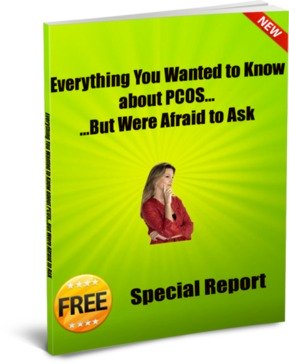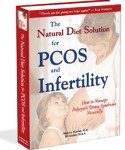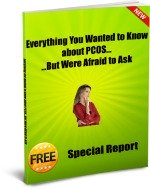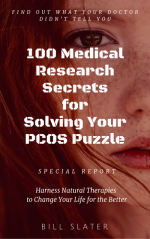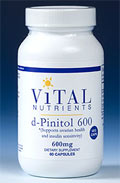PCOS Review Newsletter #125
2) TTC or Pregnant? Avoidance of Soy May Be Advisable.
2) TTC or Pregnant? Avoidance of Soy May Be Advisable.
In a past newsletter, we talked about research in lab animals showing that too much estrogen in the mother causes an immune system disorder in the daughter. This immune system disorder in turn caused PCOS in the animals.
Therefore, it would make sense that you would want avoid having your estrogen levels be too high, especially if you're trying to conceive or are pregnant.
Besides the estrogen your body naturally produces, are there external sources of estrogens or estrogen mimics that you would to avoid?
In the previous newsletter, we said exposure to the chemical BPA
If BPA is bad, are there other sources we should be concerned about? Yes, there are dozens of chemicals that are hormone disrupters. But let's switch our attention to the foods you're eating.
Have you heard of "phyto-estrogens"? These are plant substances that have an estrogenic effect in your body.
Soy is a good example. It contains substances that mostly have a mild estrogenic effect in your body, although in some circumstances they can have an anti-estrogen effect. In this respect, it's fairly similar to BPA.
The phyto-estrogens in soy are relevant because of the gigantic amounts of soy products we consume. They are especially relevant if you intend to feed your baby an infant formula containing soy, or if you are consuming soy products while you are pregnant.
Quite a number of studies of lab animals indicate that exposure to high levels of soy substances can cause a variety of reproductive problems, including reduced fertility.
It's also known that high levels of soy consumption can affect ovarian function in human adults.
OK, what if you have BPA in your system, and you're eating a lot of soy or taking soy extract as a nutritional supplement? Could your future baby be affected?
According to Peking University in China, in a study of rat embryos, the two substances could have an additive effect. The researchers said: " these two estrogenic chemicals have a synergistic effect on embryonic development when present together during the critical period of major organ formation."
Soy is not all good or all bad. We recommend that you be careful how and when you use it.
The Natural Diet Solution for PCOS and Infertility e-book excludes soy from its recommended diet. You can learn more about soy in chapter 4.4.
Sources:
Patisaul HB et al, The pros and cons of phytoestrogens, Front Neuroendocrinol. 2010 Oct;31(4):400-19
Jefferson WN et al, Oral exposure to genistin, the glycosylated form of genistein, during neonatal life adversely affects the female reproductive system, Environ Health Perspect. 2009 Dec;117(12):1883-9
Jefferson WN et al, Adult ovarian function can be affected by high levels of soy, J Nutr. 2010 Dec;140(12):2322S-2325S
Xing L et al, Embryotoxic and teratogenic effects of the combination of bisphenol A and genistein on in vitro cultured postimplantation rat embryos, Toxicol Sci. 2010 Jun;115(2):577-88.
3) How's Your Mental Health?
I suspect you know this even if your doctor doesn't: A major part of your PCOS disorder is psychological and emotional.
I don't have to describe the distress, suffering, frustration, embarrassment, desperation and hopelessness many of you are experiencing. You know exactly what I'm talking about.
You are not alone, according to emerging research. For example, the University of Iowa Roy J. and Lucille A. Carver College of Medicine studied 60 PCOS women over 22 months. 40% were depressed, 17% had major depressive disorder or other depressive syndromes. This rate might have been worse but 23% of the women were taking anti-depressants.
11.6% had anxiety syndromes, and 23.3% had binge eating disorder.
56.6% of all the women had some kind of mood disorder. The Iowa researchers also noted that 18% of the women did not start out depressed but became depressed after 22 months.
They also said menstrual function, fertility and body image (weight, hirsutism, acne) were the same among both the depressed and non-depressed women. So, surprisingly, these features were not the apparent cause of the mood disorders.
In another important study, the Karolinska Institute in Sweden reported a strong association between PCOS and anxiety. They compared 30 women with PCOS to 30 women who did not have PCOS. The groups were matched for age, weight, and body mass index.
They discovered that the PCOS women were much more anxious. Their most troublesome symptoms were reduced sleep, worry, phobias, and pain.
There's no question that polycystic ovary syndrome is actually both a physical and a mental disorder.
We can't just sweep the mental/emotional part under the rug and pretend it doesn't exist. There's an 800 lb. gorilla in the room and we all need to find ways to deal with it.
Your body and being is one whole. In your body, there is no separation between your physical parts and your mental/emotional parts. Your physical and mental aspects are in constant communication with each other and influence each other.
It should be obvious that a successful treatment program for polycystic ovary syndrome would include both physical and mental components.
But think back for a moment. When your doctor gave you a diagnosis, what did he or she do? Prescribe birth control pills, tell you to lose weight if overweight, and dart out the door to the next patient?
And what about your feelings? Your emotions? Your depression and anxiety? Your stress level? I'll bet these critical issues were never discussed or dealt with.
So it's really up to you. I encourage you to acknowledge the mental aspects of PCOS and find some ways of solving the issues of depression, anxiety, binge eating, etc.
Here are a few quick ideas to get you started.
1) Find a psychologist or other mental health professional to help you. You need to get outside your little bubble of isolation and helplessness. An experienced mental health professional can be very helpful to you and give you the support you need to make positive changes.
2) Take walks. Simple physical activity such as walking can relieve depression and anxiety, reduce the urge for compulsive eating, reduce stress, and more.
3) Keep a daily journal. Doing so will help you maintain greater awareness of what's going on in your life.
4) Find some good self-help books and read them. Maybe they will give you some good ideas. Example: "Learned Optimism: How to Change Your Mind and Your Life" by Martin Seligman, PhD.
5) Ask a health professional about nutritional supplements that may help with mood disorders. Two examples are: inositol and fish oil.
Sources:
Kerchner A et al, Risk of depression and other mental health disorders in women with polycystic ovary syndrome: a longitudinal study, Fertil Steril. 2009 Jan;91(1):207-12
Jedel E et al, Anxiety and depression symptoms in women with polycystic ovary syndrome compared with controls matched for body mass index, Hum Reprod. 2010 Feb;25(2):450-6
Follow effective action with quiet reflection. From the quiet reflection will come even more effective action." -- Peter F. Drucker
PCOS Health Review
This free newsletter gives you original and immediately usable information to help you deal with PCOS.
Get the latest research, tips for improving your health, answers to questions, success stories, and more!
Your e-mail address is totally secure. We will never misuse your information.
Enter Your Email Above to Subscribe Today
and Get Your Questions Answered in this Free Special Report!
